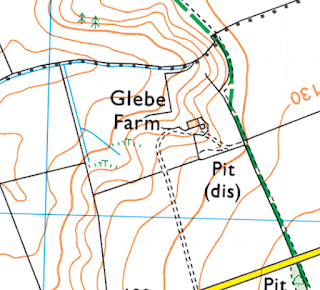Who knows? Maybe I will make this a regular feature of this humble Yorkshire blog - simply pausing to focus upon particular words. This evening I am thinking about the word "glebe".
It is a term I have often come across on my wanderings - Glebe Cottage, Glebe Lane, Glebe Woods, Glebe Farm, Glebe Common. Glebe House. The word is all over the place but what does it mean?
In the middle ages, glebe land was land that had been earmarked to supplement the income of the parish priest. The term was derived from the Old French word glèbe which itself came from Latin: gleba or glaeba meaning "clod, land, soil". It is likely that the term entered usage in England soon after the Norman Conquest of the late eleventh century.
Different parishes had different amounts of glebe land. Sometimes there would be entire farms or large patches of woodland. Please don't imagine that the priests actually farmed glebe land with their own hands. Mostly they would rent it out to tenant farmers.
On Tuesday, as I was plodding The Lincolnsgire Wolds, I noticed the following farm nestling in a hollow. Its name told me that a farm has been there for a very long time and that it once supported the incumbent priest down in the village of Donington on Bain. And as that priest may frequently have thundered to God fearing congregations - here endeth the lesson.





That is so interesting. So the glebe land was more of an income producer for the priest?
ReplyDeleteYes. It seems that way.
DeleteGlebe House is a care home for young males with a history of harmful sexual behavior. So sayeth Wikipedia. Just so you know.
ReplyDeleteThere's also Glebe Primary School and a pub in Stoke called The Glebe.
DeleteAnd I know one family here with the surname Glebe.
ReplyDeleteInteresting that it became a family name.
DeleteI actually knew this, but it is nice to read it so well put. And isn't glebe also a kind of water fowl? Oh, no, wait, that's a grebe.
ReplyDeleteHave you ever visited Graham's brother's blog? Sadly, there have been no posts for a year now at http://scriptorsenex.blogspot.com/.
But he used to frequently write about words that are less well known and rarely used, and I always enjoyed those posts.
Not everyone is fascinated by old words but I am like you in that respect. I don't think I ever visited Graham's bother's blog.
DeleteThat's a very sudden ending. Did you not find out more about the farm? I laways thought Glebe must have been the name of someone important to have so much named after him/her.
ReplyDeleteI couldn't think of anything else to say River.
DeleteThat was a word missing from my vocabulary - thanks :) (Remains to be seen whether it will stick in my memory...)
ReplyDeleteAs a Swedish citizen your grasp of English is most impressive.
DeleteSydney has a suburb called Glebe. Learning the name's origins is interesting. Priests weren't paid enough, it would seem.
ReplyDeleteMaybe next time you can tell us about the name Wold.
I have some other interesting words up my sleeve.
DeleteThe priests also lived on a tithe from the land which gave them an income. Luckily we don't have to take a chicken or quart of milk up the road to the church nowadays. Radio 4 is also exploring words. 'Woke' and .'fascist' yesterday. The problem with the negativity with using these words as our social media is finding out is that they are too easy to fling about.
ReplyDeleteI have been aware of the misuse of the word "woke" for several months now. It has unfairly become a term of derision.
DeleteYP, you've awakened (I won't put woke, because I'm not!) a long distant memory of school history lessons. I can remember learning about glebe lands and the support of the clergy. It's not a word I've thought about for many, many years.
ReplyDeleteNo photo of the farm?
I like to think that in several respects I am "woke". It is a good word that has been stolen and misused by right wingers. The farm is in a hollow and I could not get a good view of it from the path to the east.
DeleteWhen my daughter purchased her house recently she received some documents from the solicitor saying that they could in extremis be asked by the local church to pay a tax to them for the upkeep of the church and its land. I think it's an old medieval law that actually in theory never gets applied these days but it frightened the heck out of us at the time.
ReplyDeleteHow kind it would be of Kay and Darcy to repair the church roof!
DeleteI've been glib about globes but this is the first time I've heard the word glebe.
ReplyDeleteNice wordplay you clever guy!
DeleteIn the Virginia suburbs of Washington DC there is a Glebe that seems to run in every direction of the compass.
ReplyDeleteLooks like some early settlements on the east coast of the USA adopted the term "glebe".
DeleteYes! I was going to say this, too -- Glebe Road in Alexandria, Va., is a major thoroughfare.
DeleteI can't think of a clever comment for this post so I'll just say "Hi, Neil!"
ReplyDeleteAt least you are honest Ellen.
DeleteMy old field was known as the glebe ….
ReplyDeleteMany villages can claim the same.
Delete